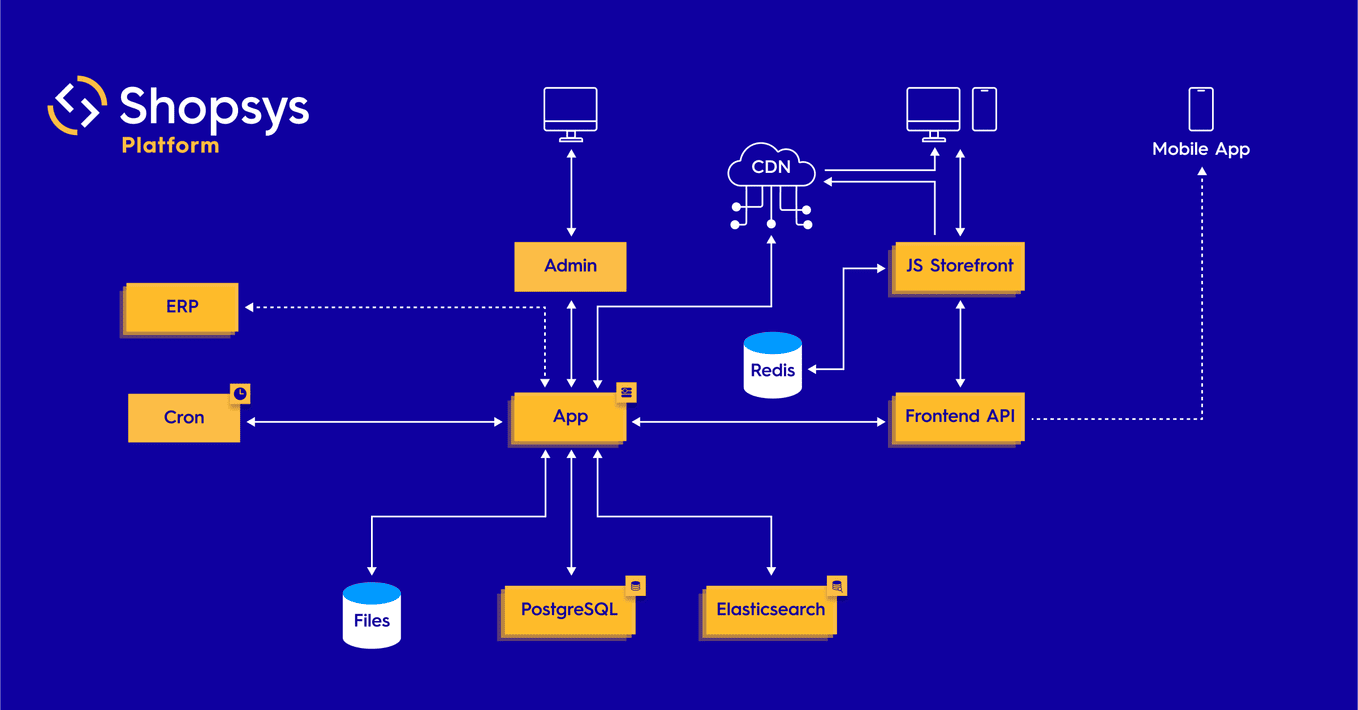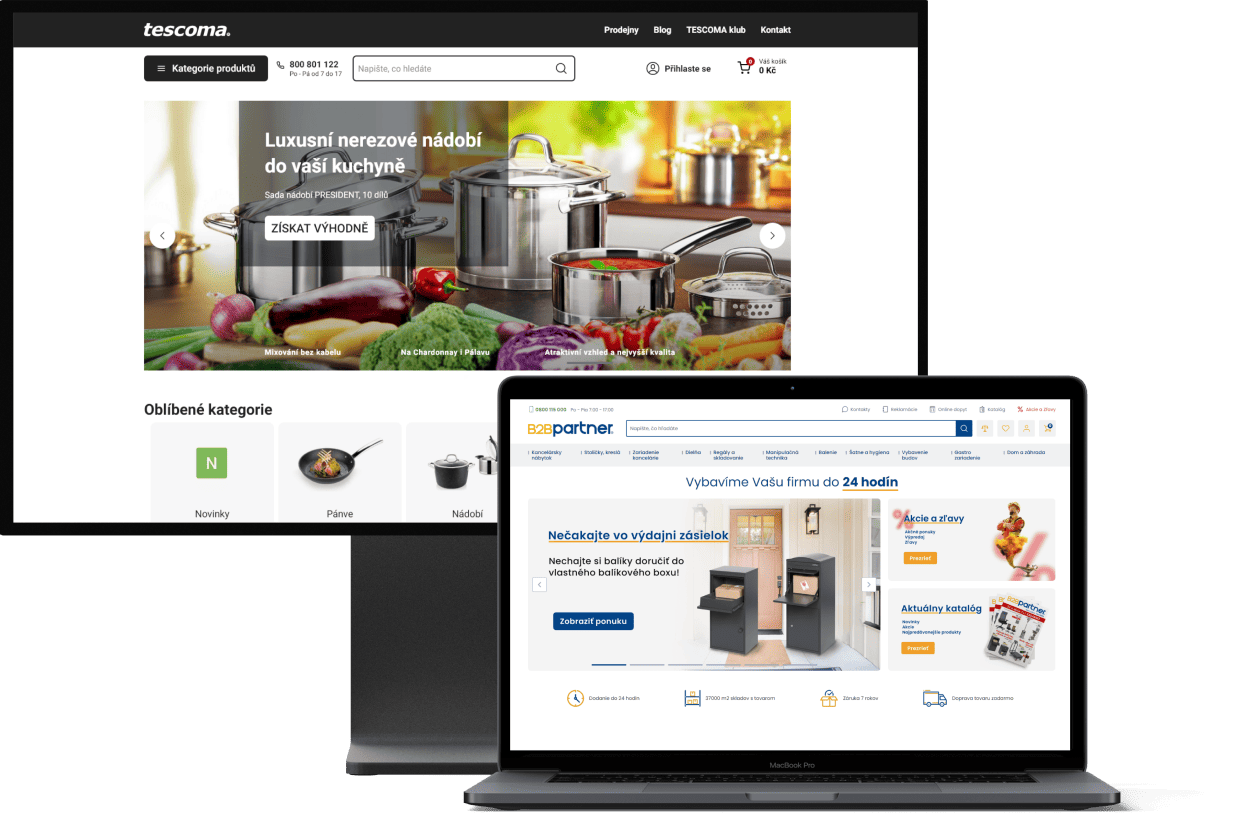Introducing the Shopsys Platform: The Solution for E-Shops that Refuse to Compromise
For 20 years, we have been dedicated to the development of large e-shops. Since 2016, we have invested tens of millions of CZK into our platform. The e-commerce market is continually advancing, and as we strive to deliver the best technologies and services to our clients, we’ve decided that it’s time for a change. We are now building projects using JavaScript technology React and paying more attention to new functionalities. The Shopsys Platform is an open-code solution that offers modern, yet proven technologies.
We first introduced the open-source Shopsys Framework to the world in 2016. Since its inception, it has been known for its extensive customization and upgrade options. Over time, we have continuously improved and advanced it. The new Shopsys Platform offers a wide range of functionalities right from the start. The core of the product remains the same, but the original storefront has been replaced with a new one built in React or Next.JS. Our goal is to continuously develop innovations that we will implement into the platform.
Introducing the Shopsys Platform
Shopsys Platform is an open-code e-commerce platform designed for building large e-shops. It is highly flexible and focuses on the ability to modify or expand any part of the e-shop for maximum customization. To elevate our platform to a new level, we have decided to introduce a headless JavaScript storefront in React. At the same time, we are merging our two versions – Shopsys Framework and Shopsys Commerce Cloud, creating a new, more feature-rich version – Shopsys Platform. The core remains the same, allowing projects based on either Shopsys Framework or Shopsys Commerce Cloud to transition to this new version. In practice, this is another version of Shopsys Framework, which will have a React-based storefront application from version 13.0.0 (storefront = the entire user interface of the e-shop).
Advantages of the React-based JavaScript Storefront
- User-Friendliness: Individual elements on the page can respond to user actions almost immediately, regardless of the quality of the internet connection. As an example, skeleton loaders can display the structure of a new page during page transitions, and the actual content loads only when the data is available.
- Faster Speed: By downloading only the essential data (e.g., product name, price, description), the amount of transferred data is reduced, enabling faster page navigation, even on slower internet connections.
- Full-fledged API: This API can be fully utilized for other applications, such as mobile apps, POS systems, and more.
- Completely Separated Frontend and Backend: This allows for the easy exchange of the backend while keeping the storefront’s functionality intact, and vice versa.

The first projects are already running on the Shopsys Platform
We have been developing, improving, and testing the new version of the JS Storefront for two years. Now, Tescoma, along with B2B partners and an e-shop manufacturer selling products in over 200 countries, is utilizing our omnichannel solution. These clients have confirmed that this approach is a suitable path for us to further enhance e-shops utilizing our platform.

Many new functionalities are part of the platform now
The merging of Shopsys Commerce Cloud and Shopsys Framework versions brings a wealth of features to the core of the Shopsys Platform that were previously only accessible in the closed version of Commerce Cloud.
These include, for example:
- Advanced GTM integration,
- Enhanced SEO categories that allow the creation of landing pages by combining filters within categories for better search engine targeting,
- Support for physical stores and multiple warehouses,
- Advanced CMS with a blog and the advanced GrapesJS editor for convenient content creation, including drag & drop control,
- Administrator permissions and roles to grant access only to what is truly necessary for their work,
- Complete configuration and deployment methods for running and implementing the application in the cloud and Kubernetes clusters,
- Integration with Zásilkovna for a popular product delivery method,
- And more on the Shopsys Platform page.
All these functionalities will be available to every new e-shop using the Shopsys Platform. Existing e-shops can choose from various upgrade paths described in the upgrade instructions when transitioning to this version.
Change in Licensing Policy
Shopsys Platform is an open-code platform, and therefore, a licensing agreement is required for its production use. The new license allows for maintaining the existing conditions for projects that started under the original license, subject to agreement. The use of the platform will be subject to fees only when you launch it as a live e-shop. The licensing fee is calculated based on the revenue generated by the project built on the Shopsys Platform, and the fee amount is determined on an individual basis.
The funds generated from licenses are used to finance further development of the Shopsys Platform. This enables the platform to continuously receive security patches, other updates, performance enhancements, and, most importantly, the ability to stay up-to-date with the latest technology versions. The most significant benefit for our clients is that their solutions won’t accumulate technological debt.
A Solution for E-Shops that Refuse to Compromise
The Shopsys Platform represents a significant milestone in our commitment to building a functional and reliable technological solution for large e-commerce players. We take pride in the growth of our clients with our existing products and look forward to what we can achieve together on this new platform.


